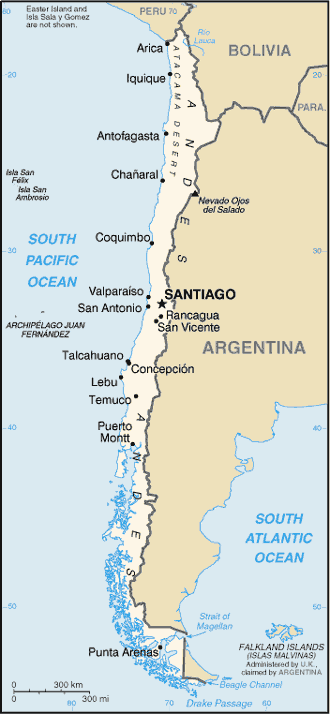Capital: Santiago
Population: 15.8 million (UN, 2003)
Year of Independence: 1810, from Spain
Type of Government: Republic
GNP: $153 billion (2001 est.)
Natural Resources: copper, timber, iron ore, nitrates, precious metals, molybdenum, hydropower
Political Parties: Center-Center Union Party (UCCP); Christian Democratic Party (PDC); Coalition of Parties for Democracy (“Concertacion”) or CPD — including PDC, PS, PPD, PRSD; Independent Democratic Union (UDI); National Renewal (RN); Party for Democracy (PPD); Radical Social Democratic Party (PRSD); Socialist Party (PS)
In 1970, Salvador Allende Gossens became the first popularly elected Marxist president of a Latin American country. His attempts to implement socialism through democratic means polarized the Chilean population. In 1973, a military coup led by General Augusto Pinochet and supported by the United States resulted in the death of thousands and nearly two decades of dictatorship. Officially, Allende committed suicide, though many believe he was murdered. After the 18-year Pinochet-led government gave way to democracy in 1990, Chile’s economy continued its rapid expansion and industrialization to form one of the most stable economies on the continent. Its current president, Ricardo Lagos, faces new economic concerns and old social ones, including a segmented and segregated population, an inadequate food supply, continued protests over the treatment of political dissidents during Pinochet’s regime, and angered politically active indigenous peoples. Those in the farther reaches, especially the indigenous populations of the north and south, feel little identification with the centralized urban population or the largely white upper class and government. Considered more economically balanced than its South American neighbors, Chile has in the past few years nevertheless been subject to currency depreciation and a sluggish economy. Foreign enterprises threaten local businesses and cause more difficulties in the urban centers.



